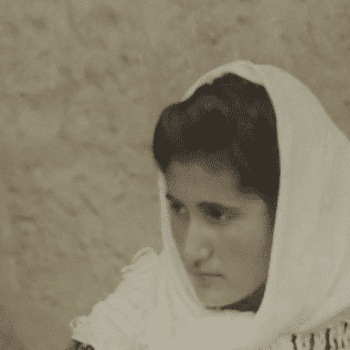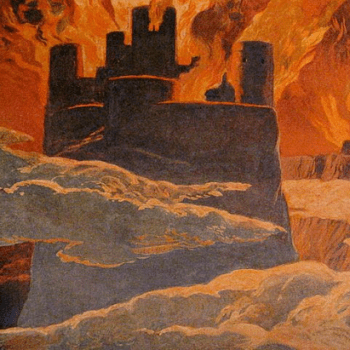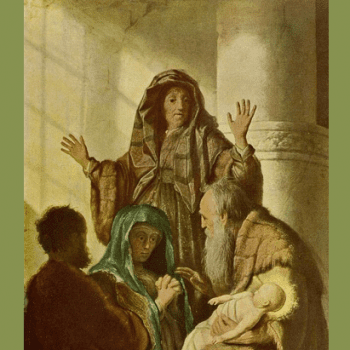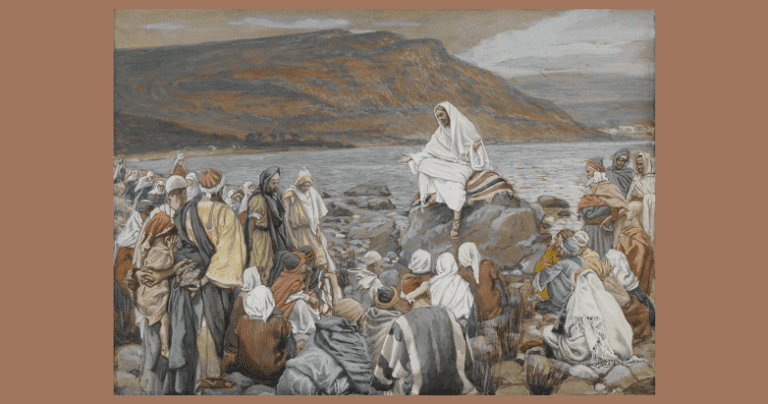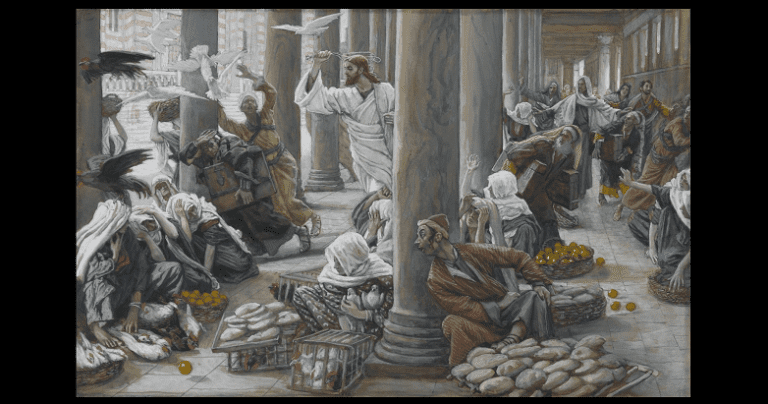
Zeal for His Father’s House, Zeal for His Father’s Children.
Exodus 20-1-17, 1 Corinthians 1:22-25 and John 2:13-25 for the Third Sunday of Lent.
In today’s first reading God gave the Ten Commandments.
Eight of them forbid sundry sins.
In the first God says: I, the Lord am your God…. You shall not have other gods besides me.
In today’s Gospel, in the Jerusalem Temple that Israel built for God, Christ strode in as if he owned it— as if he were the Lord God.
Grabbing rope, making a whip, he used it on the sellers and money changers, treating them like animals in driving them out of the Temple.
He flung their money and upended their tables.
He told off the sellers as if he had God’s authority to lay down the law as he saw it, even with physical violence against the will of others: stop making my Father’s house a marketplace.
The Gospel does not show that anyone tried to stop him.
Instead, some asked him an odd question— the kind of question to ask when wondering if a man might be a prophet from God.
What sign can you show us for doing this?
Christ’s answer drives US out of this third Sunday of Lent and into Good Friday and Easter Sunday nearly a month from now.
Destroy this temple and in three days I will raise it up.
But he was speaking about the temple of his body.
Since he used violence to drive out the marketplace from the Temple, what did Good Friday’s violence drive out from the temple of his own body?
Before turning to that, I will say that Christ was not the first to drive animals out of the Temple.
Every year on the Jewish Day of Atonement the High Priest would go into the Temple to confess and load the sins of the whole nation onto the head of a goat.
Then someone would drive the goat— the scapegoat— out of the Temple and into the wilderness, the dwelling of deadly demons.
Christ on the cross of Good Friday took onto the temple of his body the marketplace of the sins of the world, and drove them out into the wilderness of death.
So he is both the High Priest and the scapegoat.
He is also the Lamb of God who takes away the sins of the world at the price of his own life offered to God on behalf of sinners.
Christ’s violence in the Jerusalem Temple drives us toward Good Friday’s violence in the temple of his body.
After he drove out the marketplace from the Jerusalem Temple, some wanted a sign from him to show he had God’s authority for what he did.
He spoke in answer, and the Word of God in today’s second reading unfolds the same.
Jews demand signs and Greeks look for wisdom,
BUT WE PROCLAIM CHRIST CRUCIFIED,
a stumbling block to Jews and foolishness to Gentiles,
but to those who are called, Jews and Greeks alike,
Christ the power of God and the wisdom of God.
For the foolishness of God is wiser than human wisdom,
and the weakness of God is stronger than human strength.
By worldly measure there is no power or wisdom in undergoing torture and death for the sins of others.
Christ chose to do so because zeal for his Father’s house consumed him.
However, his Father’s house is more than the Jerusalem Temple.
The Word of God says the Father’s house is the Church, and that the Church is also the Body of Christ.
Baptized into the death and resurrection of Christ, you and I are the Church, the Body of Christ, the temple and household of God.
By the violence of the cross, Christ zealously drove out from the body of his humanity and ours the marketplace of sins whose guilt he had taken onto his own head.
Bearing in mind that we are his body, and that the marketplace of sin is in us, his Gospel today takes on rich meaning.
Stop making my Father’s house a marketplace.
Zeal for your house will consume me.
Destroy this temple and in three days I will raise it up.
But he was speaking about the temple of his body.
In the Jerusalem Temple, Christ acted out the violent zeal he has for you and for me.
Christ has violent zeal to drive sin out of us, saving us so the Father may be at home within us.
In giving his Body and Blood for us to eat and drink, Christ commits and sacrifices himself TO US, just as eating is an act of violence in which what is living dies to be our food.
His ZEAL for US consumes HIM.
We consume him and his zeal for our salvation.
If we let his zeal for our salvation come to nothing, then we let ourselves be a marketplace of sin.
Then, even if we BELIEVE IN HIS NAME, he will NOT TRUST us, for today’s Gospel says:
many began to BELIEVE IN HIS NAME….
But Jesus would NOT TRUST himself to them because he knew them all….
If we believe in him, let us call up our violent zeal to drive out from ourselves the marketplace of sin.
Then Christ who knows us all will have reason to entrust himself to us.
Turn. Love. Repeat.



